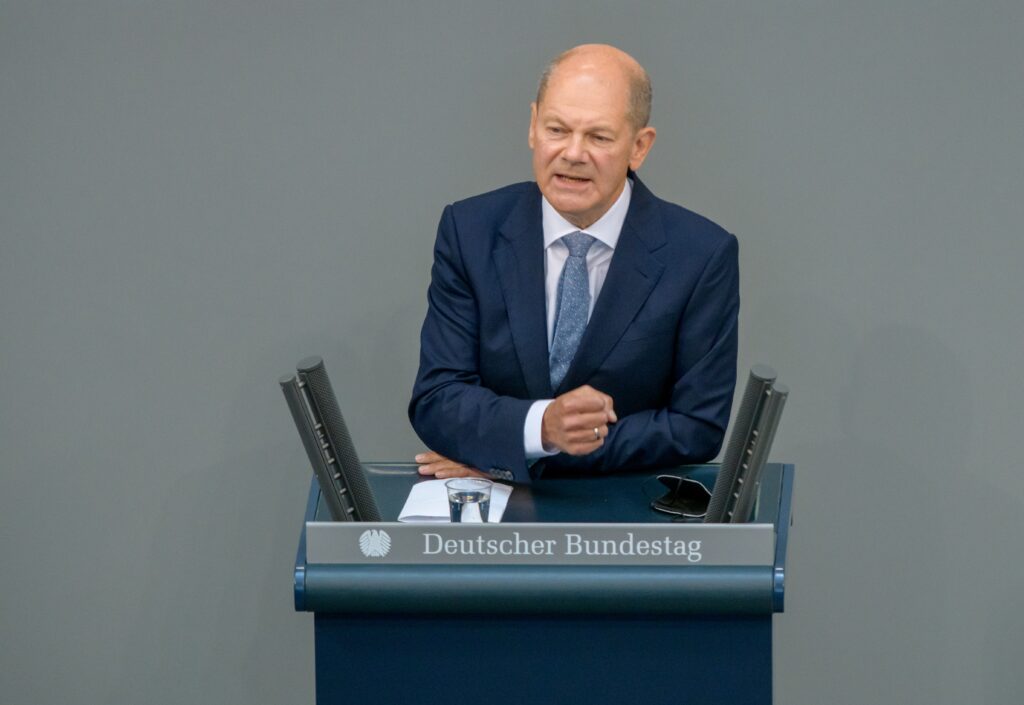German Chancellor Olaf Scholz has strongly criticized opposition leader Friedrich Merz after the far-right Alternative für Deutschland (AfD) backed his controversial migration policy proposals. Scholz accused Merz of dismantling Germany’s political firewall against the far right, calling his actions “an unforgivable mistake.”
Merz introduced two non-binding motions in parliament aimed at strengthening border security and rejecting more asylum seekers. One of them, a “five-point plan” to curb irregular migration, passed by a narrow vote of 348 to 345, with 10 abstentions. The governing Social Democrats (SPD) and Greens have condemned the proposal, arguing that it violates both German and EU asylum laws.
Migration Debate Escalates as Security Concerns Grow
The vote followed a knife attack by a rejected Afghan asylum seeker, which resulted in the deaths of two people. The suspect had been receiving psychiatric treatment and was scheduled for deportation, but bureaucratic delays postponed the process. Public anger over the case, along with a recent attack in Magdeburg where an SUV plowed into a Christmas market, killing six people, has intensified calls for tougher migration policies.
Merz’s push for stricter border controls is seen as a political strategy ahead of Germany’s February 23 election. His CDU/CSU bloc, which is currently leading in the polls, has taken a harder stance on immigration, positioning itself as a tough-on-migration alternative to Scholz’s coalition. Critics argue that Merz is capitalizing on public fear to shift the debate to the right.
CDU Under Fire for Accepting AfD Support
In a tense parliamentary debate, Scholz accused Merz of breaking a fundamental political principle by aligning with the AfD. “You are working with those who fight against our democracy, despise Europe, and spread division in our country,” Scholz said, condemning Merz’s decision.
Deputy Chancellor Robert Habeck (Greens) joined the criticism, urging Merz: “Do not vote with racists. It is unnecessary and dangerous.”
Merz dismissed the accusations, insisting that AfD’s support was not sought, but necessary to pass the motion. “A correct decision does not become wrong just because the wrong people agree with it,” he stated.
AfD leader Alice Weidel celebrated the vote, declaring: “The so-called firewall is nothing more than an anti-democratic pact.” She added that Merz had essentially adopted AfD policies.
Merz is expected to present a new migration bill on Friday, but it will not become law before the election. If he becomes chancellor, he will likely push it through.
Public Opinion Backs Merz, but Churches Warn of Dangerous Precedent
A recent Insa poll revealed that 66% of Germans support Merz’s migration plan, including 56% of SPD voters. However, while both the CDU/CSU and SPD have lost ground in recent polls, the AfD has gained four percentage points.
Germany’s Protestant and Catholic churches issued a joint letter warning against CDU’s reliance on AfD support. “Breaking this long-held political taboo could do lasting damage to German democracy,” the statement read.
The churches also criticized the tone and timing of the debate, warning that it risks fueling anti-migrant sentiment rather than addressing real policy challenges.
